|
(22 February 2011, Judge Business School, University of Cambridge)
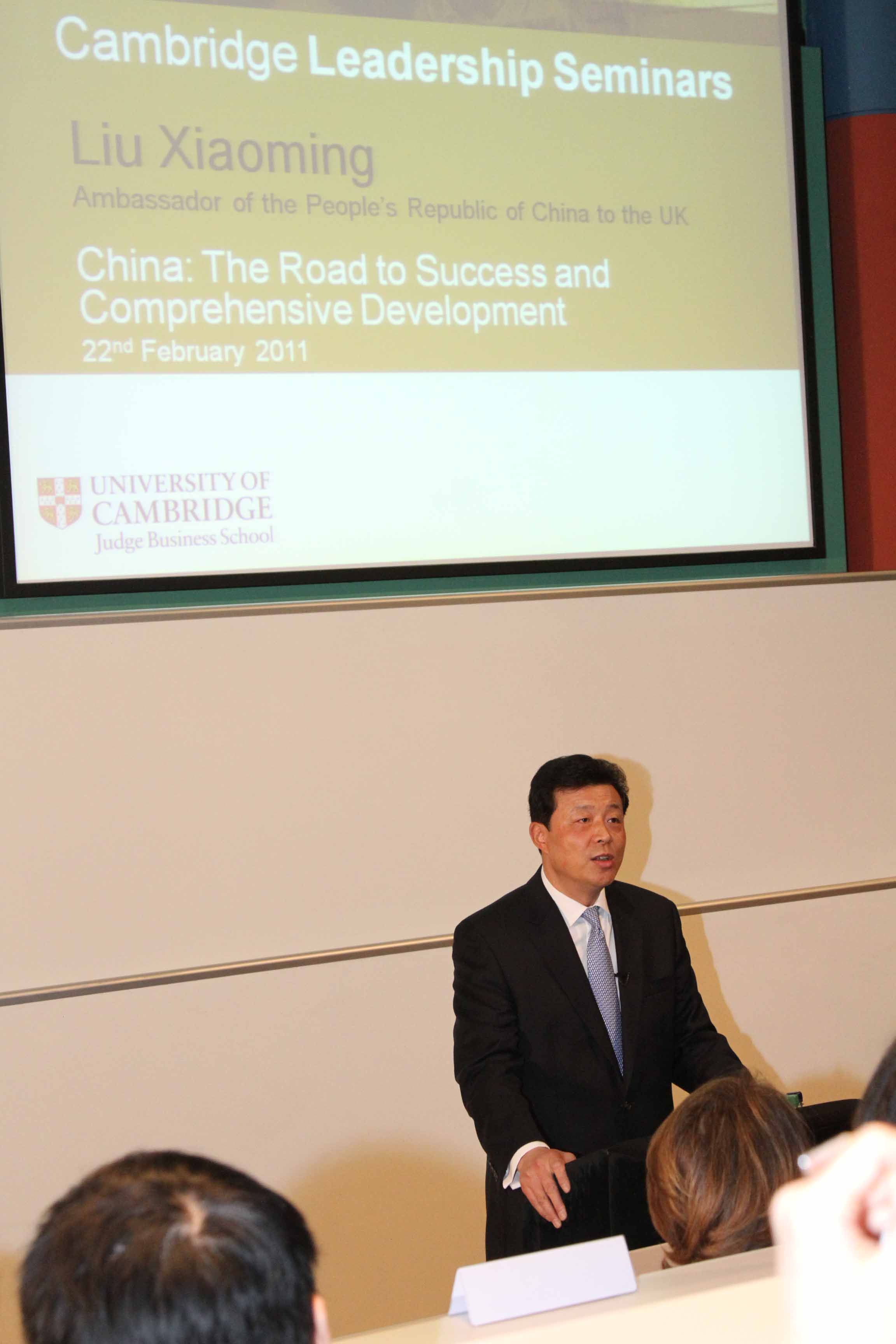
Vice Chancellor Sir Leszek Borysiewicz,
Faculty members,
Students,
It is my great pleasure and privilege to visit Cambridge at the invitation of the Vice Chancellor and to speak at the Judge Business School.
This is my first visit to Cambridge as Chinese Ambassador to the UK. Yet Cambridge is no stranger to me. I heard a saying: "If you want to meet prime ministers, go to Oxford; but for Nobel Prize winners, go to Cambridge". Cambridge alumni won 88 Nobel Prizes, as many as the prizes won by Britain as a country, ranking first in all the universities around the world.
I first got to know Cambridge from Chinese poet Xu Zhimo who wrote his best-known poem Farewell to Cambridge, and later from Dr Joseph Needham who wrote and edited the epic series Science and Civilisation in China.
My first visit to a place called Cambridge was 29 years ago when I was a student at the Fletcher School of Law and Diplomacy, which was then jointly administered by Tufts and Harvard. As Fletcher and Harvard shared the same library call number, I went to the Harvard Cambridge Library quite often.
Today I have finally come to the real Cambridge, both on a personal journey to fulfil a long-cherished dream of seeing Cambridge and experiencing its 800-year heritage and on an official visit to discuss educational cooperation and to talk about China.
Last week one of the headline news was that China has officially overtaken Japan as the world's second largest economy. This has put China in the limelight once again and stoked an ongoing discussion about China. Many questions were asked: What does China being the second largest economy tell us? How soon is China going to be number one? Will China be able to sustain such rapid growth? What does China's development mean to the world? The list can go on and on. But these are the most asked questions. Let me share my thoughts about these questions.
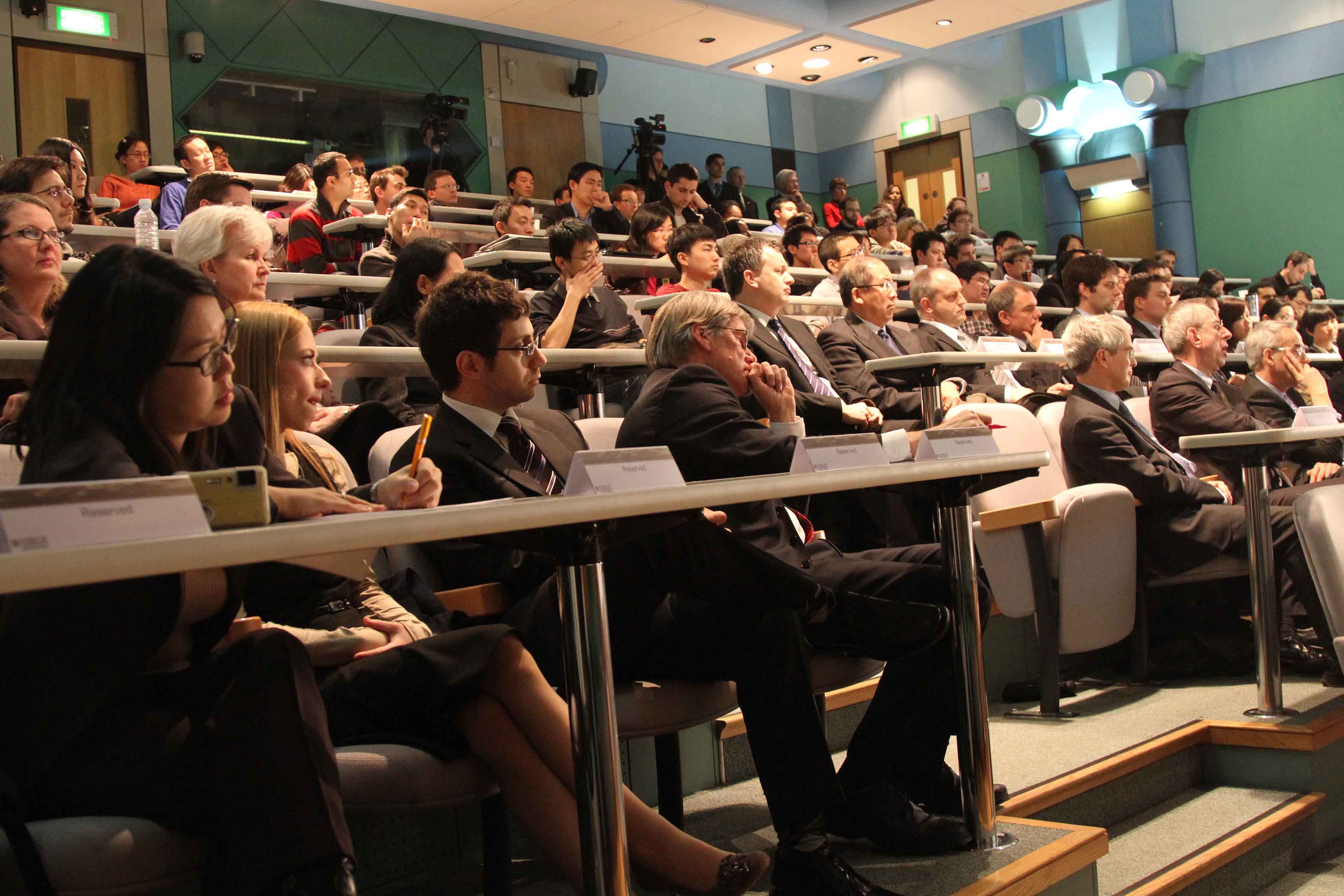
First question: What does it tell us that China rolls in at number two? I think it tells the successful story of China's development.
The secret of China's success is simple and open. That is China has found a development model well suited to its national conditions. How should we go about developing a country with 1.3 billion people and a history of 5 thousand years? Neither textbooks nor history has given us the ready answer. As Mr Deng Xiaoping termed it, we managed to "cross the river by feeling for the stones". We explored our way forward in a pioneering spirit by combining the useful experiences of other countries with the unique circumstances of China.
China's success also lies in its commitment to reform and opening-up. Opening-up means embracing the global economy at every level and in every area. But it is much more than that. It also means freeing your mind, fostering a more open and diverse society. It means nurturing a culture of open and transparent government. Reform is about transforming the planned economy to a vibrant socialist market economy. It is also about making comprehensive progress in political, social and cultural spheres.
Some people in the West believe China has carried out reform only in economic sector, not in political system. This is a misunderstanding of China's comprehensive reform. During the past 3 decades, political reform has come with economic reform every step of the way, and political progress has been achieved hand in hand with economic growth. We have seen a growing role of the National People's Congress and multi-party political consultation under the leadership of the Communist Party. Democratic decision making and the legal system has been strengthened. The millennium-old pattern of "rule by man" is giving way to the rule of law. We have also seen significant progress in human rights. The promotion and protection of human rights has been written into the Chinese Constitution. All citizens enjoy the rights protected by law to equal participation and development. We have also strengthened international cooperation on human rights.
It was not for lack of trying that Western-style democracy did not bring China the prosperity and strength it had wanted so badly in its modern history. Now that we have found our own road to success and Chinese style democracy, why should we waver or give it up?
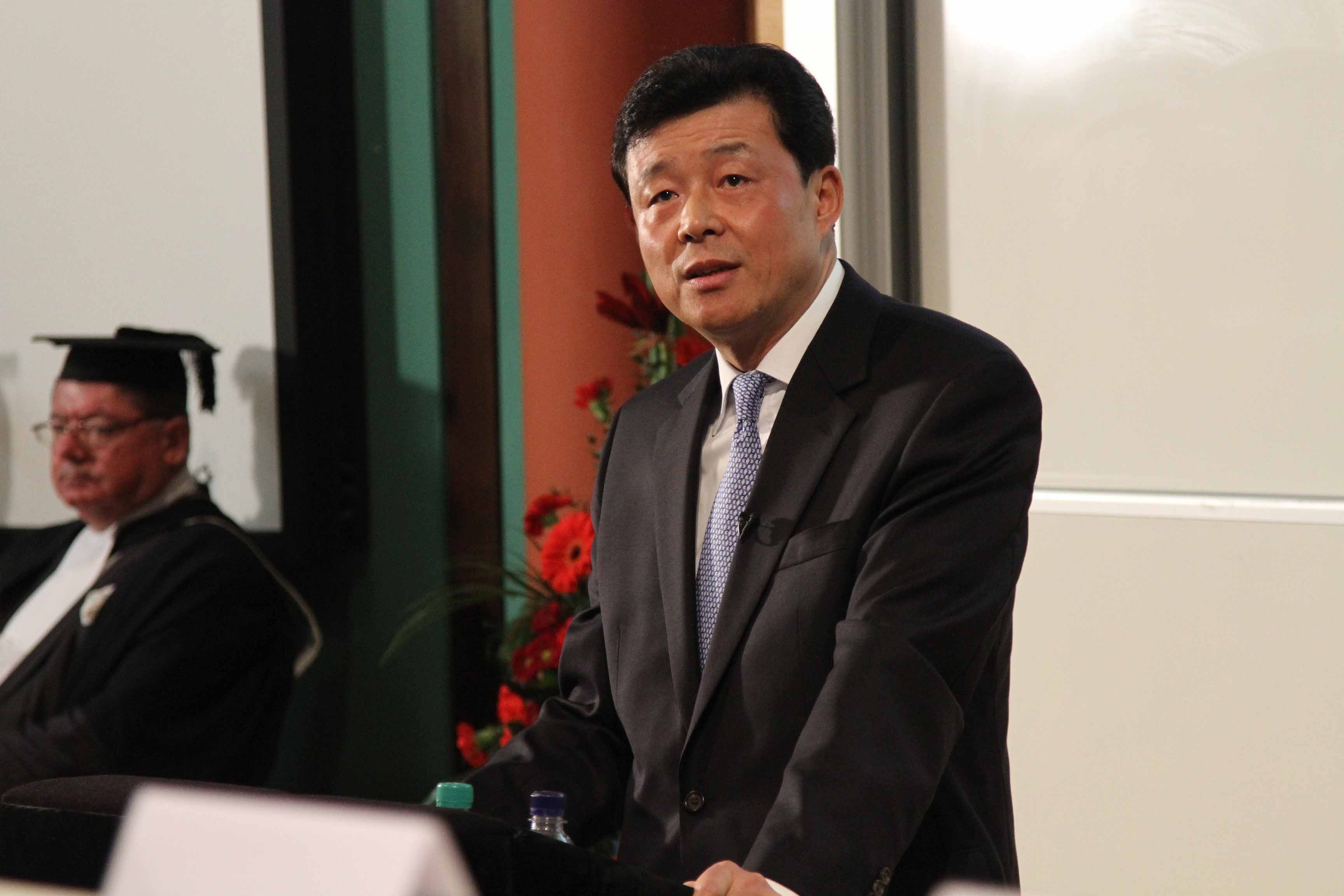
Second question, how soon is China going to overtake the US? Before we answer this question, let's look at some key words:
"Aggregates" and "per capita". China's economic aggregates stood at 5.8 trillion US dollars in 2010, ranking second in the world. But its per capita GDP was merely 4,300 US dollars, lower than about 100 other countries, only one ninth of the UK, and one tenth of the US.
"Coastal" and "inland", "urban" and "rural". We have in China both rich cities in the coastal regions and under developed poor regions in the west of the country. The urbanisation rate is only 46%, and the urban/rural income ratio is as high as 3.23 to 1. I served for two years as Assistant Governor in one of the poorest provinces in northwest China – Gansu. Gansu suffers from tough natural conditions. Desertification threatens the livelihood of the local people and economic development is a huge challenge. Many of the children in the countryside do not have access to computers or the internet. Many boys and girls have to drop out of school because their families cannot afford their continued education.
"Made in China" and "created in China". For all its manufacturing strength, China is still at the lower end of the value chain. In many cases only the labour-intensive parts of production such as processing and packaging are done in China. R&D, design, key components and marketing are done elsewhere. 90% of China's export commodities are OEM products. 20% of the retail value of every mobile phone, 30% that of computers and 20-40% that of Computer Numerical Control machine tools go to foreign patent owners. There is still a long way to go from "Made in China" to "created in China".
"Energy-intensive" and "energy-efficient". Statistics show that China's energy intensity is 3 to 4 times that of the international average and 8 times that of the UK. China consumes 46% of the world's iron and steel, 16% of energy, 52% of cement, and only produces 8% of the world's GDP. China still has a lot to do to raise the quality and efficiency of its economic growth.
Although China is now number 2 economy in the world, we still lag far behind developed countries in per capita income and quality of GDP. China is still a developing country, not because we are modest or hypocritical, or we wish to escape from our responsibilities. Development will remain a top priority for China for a long time to come.
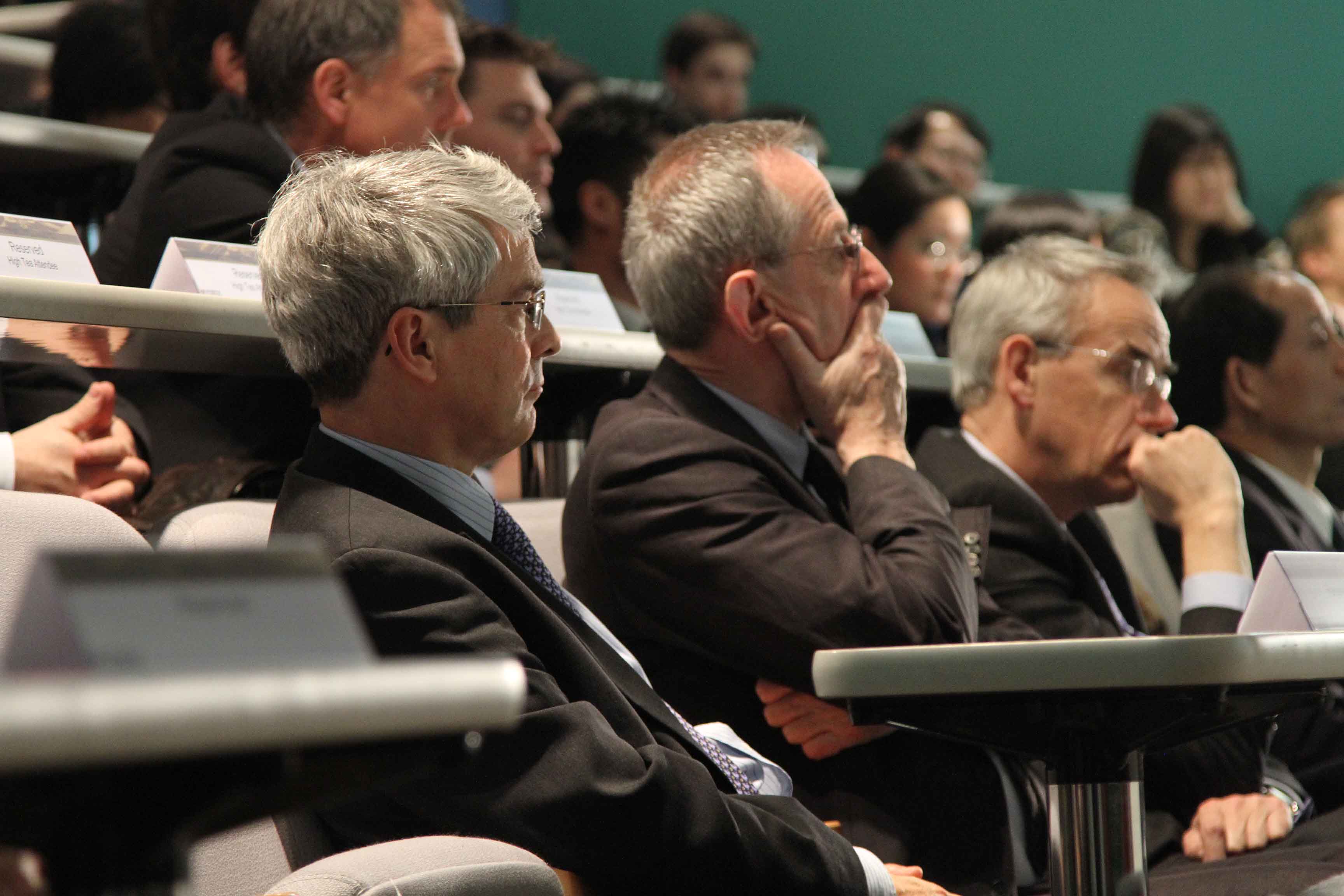
Third question: Can China sustain its fast growth after 3 decades?
The answer is positve. China is still in the course of rapid industrialisation and urbanisation. This is a phase when massive infrastructure investment is needed. 300 million people are expected to move from the countryside to the cities in the next 20 years. The Chinese people need to upgrade their consumption pattern, and the western regions need to catch up with their eastern counterparts. So driving force is never lacking for the Chinese economy, and there is plenty of potential to be tapped. We have reasons to be optimistic about the future.
The National People's Congress will review China's 12th Five-Year Plan at its annual session next month. This is an important blueprint for China's development in the next 5 years.
We will carry out strategic economic restructuring to expand domestic demand and promote balanced growth driven by consumption, investment and exports. We will strengthen agriculture, increase the competitiveness of manufacturing, and give priority to emerging industries and the services sector. The aim is to seek a balanced and coordinated development between urban and rural areas and between east and west.
We will promote scientific and technological progress and innovation. We will speed up efforts to turn China into an innovation-driven country. As Mr Deng Xiaoping pointed out, "There is no other productive force more important than science and technology". Our future development must rely on scientific and technological progress, a higher quality labour force and innovative management.
We will continue to improve the lives of our people. Economic development is aimed at serving people's interests. We will improve social security, increase job creation, promote equal access to public services and balance income distribution. This will ensure that the benefits of development will be shared by all.
We will build an energy-efficient and environment-friendly society. We need to catch up with developed countries in terms of per capita GDP, but not per capita energy consumption, as this would be unsustainable for our planet. China cannot follow the traditional Western way of industrialisation. We must raise energy efficiency, reduce emission intensity, develop a circular economy, extensively apply low-carbon technologies and actively address climate change. We must promote sustainable development, achieving an appropriate balance between economic, social progress and population, resources and the environment.

The fourth and last question: What does China's development mean to the world, a blessing or catastrophe, opportunities or threats? This question can be answered in 3 aspects:
Is China a threat to world peace? China follows an independent foreign policy of peace. We solemnly pledged to the world that hegemony or expansion is never an option for China; China stands for non-interference in others' internal affairs and negotiated solutions to international disputes. China believes that security should be based on mutual trust, mutual benefit, equality and coordination. China is the largest contributor of peacekeepers amongst the UN Permanent 5, having sent 10 thousand peacekeepers on 24 UN missions. It has sent escort ships to the waters off the Somali coast and worked with the navies of other countries to combat piracy and improve safety in international waters. It has actively worked to facilitate the Six-Party Talks to uphold peace and the stability of the Korean Peninsula and Northeast Asia. China is in every way an upholder of peace and a facilitator of stability.
Is China a threat to the world economy? China has been a crucial support for global growth since the start of the financial crisis. It drove global demand at a time when developed countries were in economic difficulties. This was reflected in the 31.9% increase of EU exports and the 42% increase of UK exports to China last year. China maintained a double-digit growth last year, and contributed 20% of global economic growth. China will continue to pursue a strategy of win-win opening-up over the next decade. Its market will open wider, its share in international trade will increase, and its imports will rise. These will no doubt create enormous opportunities for countries around the world.
Is China a threat to the international system? China has been participating in and contributing to the current international system as a responsible major player. It has entered into extensive cooperation with its partners in developed and emerging economies on the reform of global economic and financial governance, and jointly advocated a greater role of the G20. It has strengthened traditional friendships with other developing countries and helped them develop their economies and reduce poverty. The loans it has provided to other developing countries in the past two years have surpassed those of the World Bank. It supports and practices multilateralism, and stands for greater democracy in international relations. This can be seen by its active participation in regional cooperation, along with the support it gives to tackling global challenges such as climate change, energy, resources, food security and terrorism.
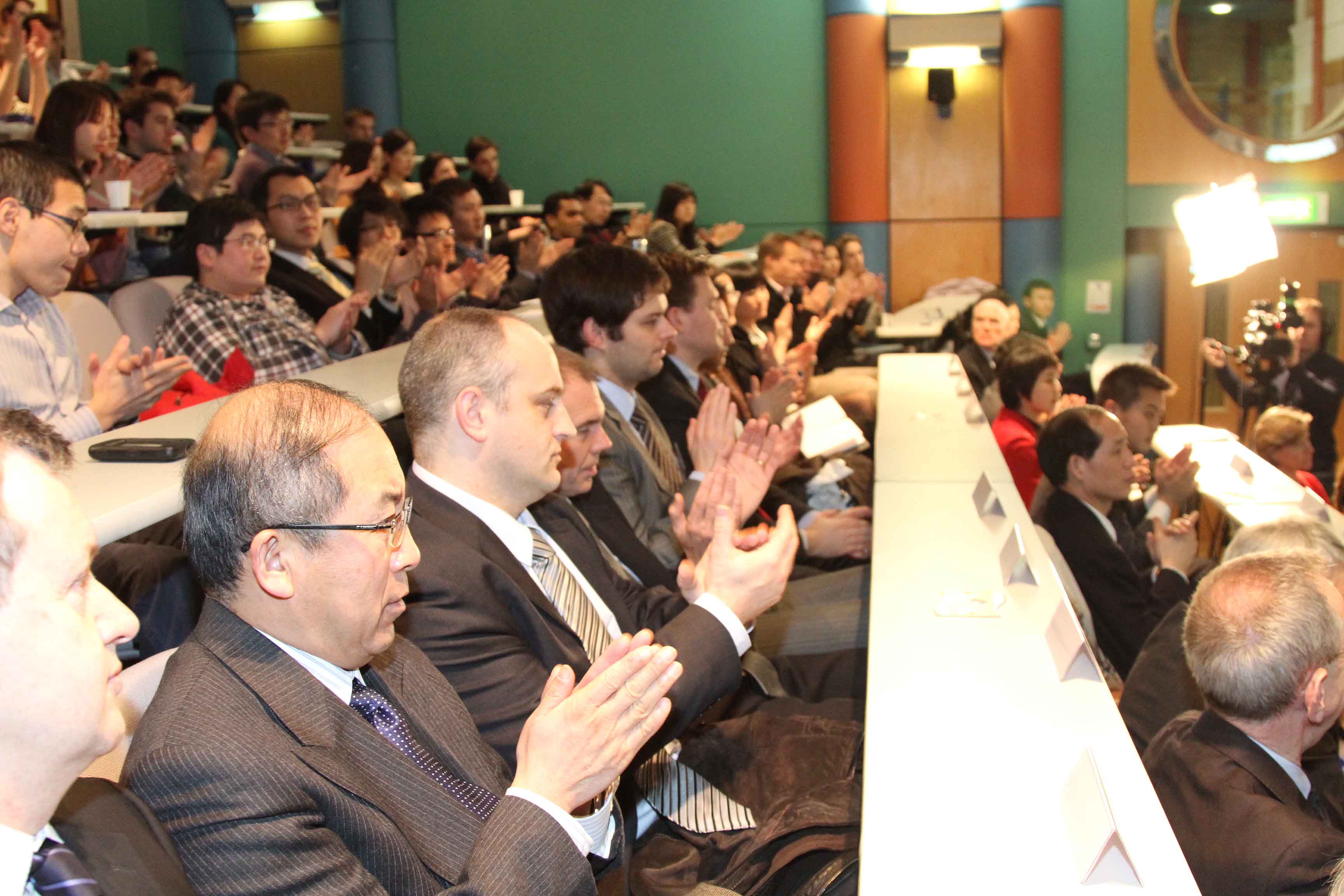
China's development is a blessing, not a catastrophe to the world. It means opportunities, not threats. It is not to be worried about, still less feared. As Franklin Roosevelt put it, "the only thing we have to fear is fear itself".
Faculty members and students,
Over the past 8 centuries, the University of Cambridge has stayed true to its motto "From here, light and sacred draughts" (Hinc lucem et pocula sacra) in its tireless pursuit of the world's truth and knowledge. More than half a century ago, Dr Joseph Needham uncovered the treasures of China's ancient science and civilisation. Today when you look at China, you will realise that it is embarking on a journey no country has ever made. This goes beyond the knowledge of human beings and offers enormous opportunities. I therefore encourage you to follow Cambridge's motto to renew your efforts in tapping the rich resources China has to offer and lead the UK and the world in studying and understanding today's China.
Thank you and now I would like to take questions from you.
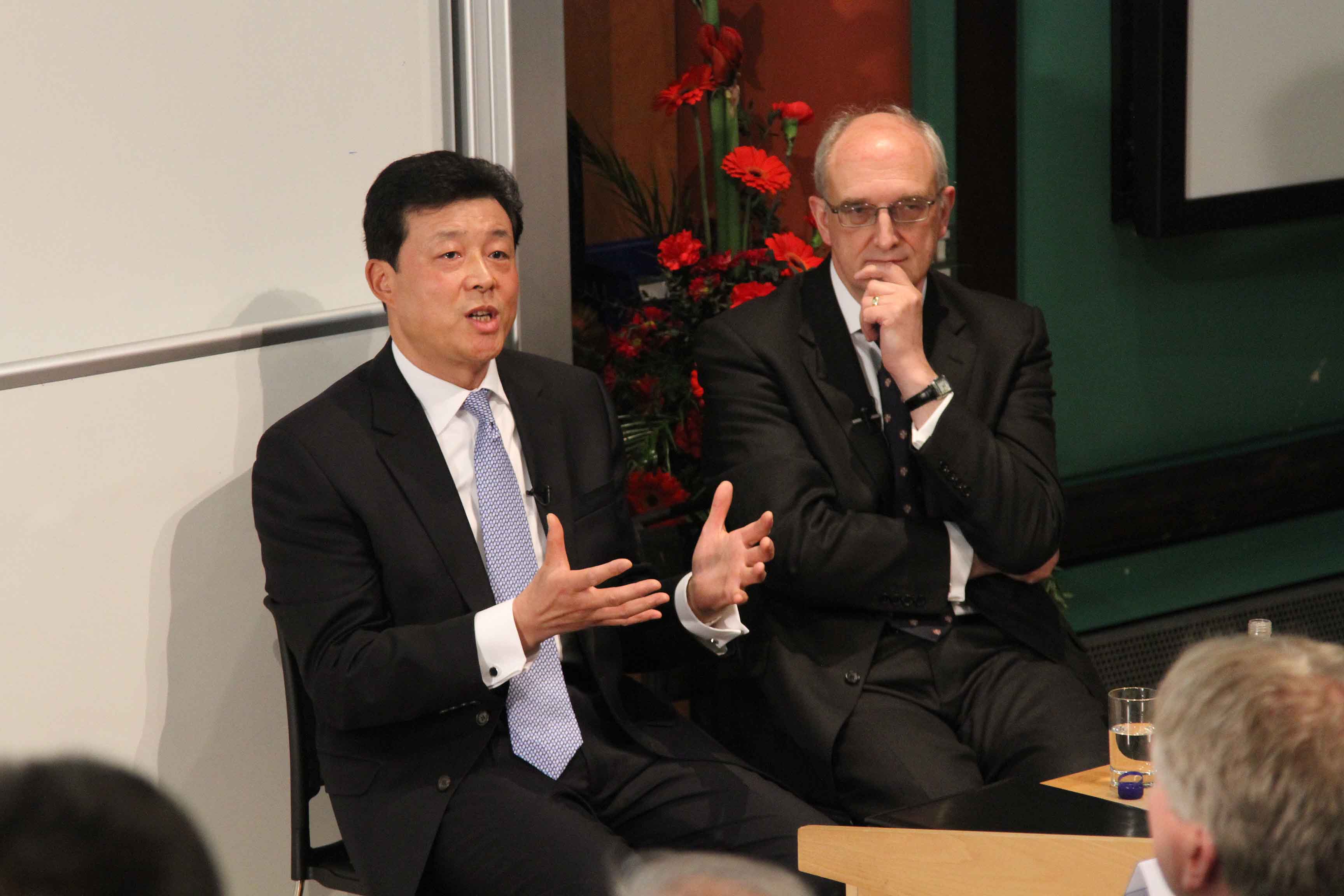
(Ambassador Liu answering questions from the audience, with Sir Leszek Borysiewicz on his right)
|

